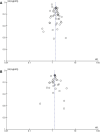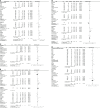Do proton pump inhibitors alter the response to immune checkpoint inhibitors in cancer patients? A meta-analysis
- PMID: 36776847
- PMCID: PMC9910608
- DOI: 10.3389/fimmu.2023.1070076
Do proton pump inhibitors alter the response to immune checkpoint inhibitors in cancer patients? A meta-analysis
Abstract
Introduction: Gut microbiota can significantly affect the effectiveness of immune checkpoint inhibitors (ICIs) in cancer patients. Recently, antibiotics were shown to decrease survival rate of patients treated by ICIs. Proton pump inhibitors (PPIs) can indeed modulate microbiota's diversity, therefore altering ICIs response. A meta-analysis was performed based on published data to verify this hypothesis.
Methods: In this study, over 41 publications, exploring the impact of concomitant PPI treatment on outcomes of ICI-treated patients, were analyzed. Evaluated endpoints were overall survival (OS) and progression-free survival (PFS). Pooled hazard ratios (HRs) with a 95% confidence interval (CI) were reported in ICIs in PPI users versus non-PPI users. Subgroup analyses were performed to minimize the impact of study heterogeneity and to investigate the influence of PPI on the different groups of interest. There was no evidence of publication bias for OS and PFS analysis in subgroup analysis.
Results: Forty-one studies were included in the meta-analysis, including a total of 20,042 patients. OS of patients receiving ICIs was negatively correlated in patients concomitantly treated with PPI (HR=1.37; 95%CI, 1.23-1.52). PFS of cancer patients receiving ICIs was also negatively correlated with PPI treatment (HR=1.28; 95%CI, 1.15-1.42). PPI and ICI use was associated with worst OS and PFS not only for non-small-cell lung cancer (NSCLC) or urothelial cancer patients but also for patients treated with anti PD-1 (OS) and anti PD-L1 (OS and PFS) immunotherapies when administered in non-first line and when PPI was received as baseline treatment or in 60 days before ICI initiation. PPI and ICI use also showed the worst OS and PFS for patients from Europe and Asia.
Conclusion: This meta-analysis suggests that PPI treatment leads to significantly worse outcomes in advanced cancer patients treated by ICIs in terms of PFS and OS.
Keywords: immune checkpoint inhibitors; meta – analysis; proton pump inhibitors; solid cancer; survival.
Copyright © 2023 Lopes, Pabst, Dory, Klotz, Gourieux, Michel and Mascaux.
Conflict of interest statement
CM was employed by Roche, AstraZeneca, MSD, Kephren, Janssens, Bristol-Myers Squibb, Pfizer, Takeda, Sanofi, Boehringer Ingelheim, Novartis, and Amgen. BG was employed by MSD, Sobi, and Pfizer. AD was employed by Novartis, Amgen, Takeda, and Pfizer. The remaining authors declare that the research was conducted in the absence of any commercial or financial relationships that could be construed as a potential conflict of interest.
Figures





Similar articles
-
An Up-To-Date Investigation Into the Correlation Between Proton Pump Inhibitor Use and the Clinical Efficacy of Immune Checkpoint Inhibitors in Advanced Solid Cancers: A Systematic Review and Meta-Analysis.Front Oncol. 2022 Feb 24;12:753234. doi: 10.3389/fonc.2022.753234. eCollection 2022. Front Oncol. 2022. PMID: 35280736 Free PMC article.
-
Association of proton pump inhibitor use with survival outcomes in cancer patients treated with immune checkpoint inhibitors: a systematic review and meta-analysis.Ther Adv Med Oncol. 2022 Jul 15;14:17588359221111703. doi: 10.1177/17588359221111703. eCollection 2022. Ther Adv Med Oncol. 2022. PMID: 35860836 Free PMC article.
-
Impact of Antibiotics and Proton Pump Inhibitors on Efficacy and Tolerance of Anti-PD-1 Immune Checkpoint Inhibitors.Front Immunol. 2021 Oct 27;12:716317. doi: 10.3389/fimmu.2021.716317. eCollection 2021. Front Immunol. 2021. PMID: 34777340 Free PMC article.
-
Efficacy of first-line atezolizumab combination therapy in patients with non-small cell lung cancer receiving proton pump inhibitors: post hoc analysis of IMpower150.Br J Cancer. 2022 Jan;126(1):42-47. doi: 10.1038/s41416-021-01606-4. Epub 2021 Oct 28. Br J Cancer. 2022. PMID: 34711947 Free PMC article. Clinical Trial.
-
The Association between Baseline Proton Pump Inhibitors, Immune Checkpoint Inhibitors, and Chemotherapy: A Systematic Review with Network Meta-Analysis.Cancers (Basel). 2022 Dec 31;15(1):284. doi: 10.3390/cancers15010284. Cancers (Basel). 2022. PMID: 36612290 Free PMC article. Review.
Cited by
-
The Impact of Proton Pump Inhibitors on the Efficacy of Immune Checkpoint Inhibitor Combinations in Patients with HBV-Associated Advanced Hepatocellular Carcinoma.J Hepatocell Carcinoma. 2024 Jul 4;11:1311-1321. doi: 10.2147/JHC.S464033. eCollection 2024. J Hepatocell Carcinoma. 2024. PMID: 38979082 Free PMC article.
-
Nutrition and Diet Patterns as Key Modulators of Metabolic Reprogramming in Melanoma Immunotherapy.J Clin Med. 2025 Jun 12;14(12):4193. doi: 10.3390/jcm14124193. J Clin Med. 2025. PMID: 40565936 Free PMC article. Review.
-
The Characterization of Non-oncologic Chronic Drug Therapy in Bladder Cancer Patients and the Impact on Recurrence-Free and Cancer-Specific Survival: A Prospective Study.J Clin Med. 2023 Oct 25;12(21):6749. doi: 10.3390/jcm12216749. J Clin Med. 2023. PMID: 37959213 Free PMC article.
-
Drug Repurposing to Circumvent Immune Checkpoint Inhibitor Resistance in Cancer Immunotherapy.Pharmaceutics. 2023 Aug 21;15(8):2166. doi: 10.3390/pharmaceutics15082166. Pharmaceutics. 2023. PMID: 37631380 Free PMC article. Review.
-
Impact of proton pump inhibitors on the onset of gastrointestinal immune-related adverse events during immunotherapy.Cancer Med. 2023 Oct;12(19):19530-19536. doi: 10.1002/cam4.6565. Epub 2023 Sep 22. Cancer Med. 2023. PMID: 37737046 Free PMC article.
References
-
- Forgacs I, Loganayagam A. Overprescribing proton pump inhibitors. BMJ (2008) 336(7634):2–3. doi: 10.1136/bmj.39406.449456.BE - DOI - PMC - PubMed
-
- Esteves M, Rollason V, Grosgurin O. Surprescription des inhibiteurs de la pompe à protons [Proton pump inhibitors overprescription]. Rev Med Suisse (2017) 13(579):1782–6. - PubMed
-
- Gadgeel S, Rodriguez-Abreu D, Speranza G, Esteban E, Felip E, Domine M, et al. . Updated analysis from KEYNOTE-189: pembrolizumab or placebo plus pemetrexed and platinum for previously untreated metastatic nonsquamous non-Small-Cell lung cancer. J Clin Oncol (2020) 38(14):1505–17. doi: 10.1200/JCO.19.03136 - DOI - PubMed
Publication types
MeSH terms
Substances
LinkOut - more resources
Full Text Sources
Medical
Research Materials

